-
 Find in Members
Find in Members Find in Videos
Find in Videos Find in Channels
Find in Channels
This website uses cookies to ensure you get the best experience on our website.
To learn more about our privacy policy Click herePrivacy Preference
- Tags - #anxiety
-
- Last updated Mar 21 0 comments, 57 views, 0 likes
- Bhopal, Madhya Pradesh, India - Get Directions
More from Dr. Sanjeet Diwan
More in Politics
Related Blogs
Anxiety in Focus: Root Causes and Modern Approaches to Management
Body
Anxiety is a common mental health issue that affects millions of people around the world. It is characterized by feelings of fear, worry, and unease, and can significantly impact a person's daily life. While some level of anxiety is normal and even beneficial in certain situations, when it becomes excessive and interferes with daily activities, it can be classified as a disorder. In recent years, there has been an increase in the number of people seeking help for anxiety-related issues, leading to a growing focus on understanding its root causes and finding effective ways to manage it. As a psychiatrist in Bhopal, I have seen firsthand the impact of anxiety on individuals and the importance of addressing it with a holistic approach.
The root causes of anxiety are complex and multifaceted, and can vary from person to person. However, some common factors that contribute to the development of anxiety disorders include genetics, brain chemistry, and life experiences. Research has shown that individuals with a family history of anxiety disorders are more likely to develop one themselves, indicating a genetic predisposition. Additionally, imbalances in neurotransmitters, such as serotonin and dopamine, can also play a role in the development of anxiety. Traumatic events, chronic stress, and other life experiences can also trigger or exacerbate anxiety symptoms.
In today’s fast-paced and highly demanding world, it is not surprising that anxiety disorders are on the rise. The pressure to succeed, constant exposure to social media, and the fear of missing out (FOMO) can all contribute to feelings of anxiety. Moreover, with the ongoing pandemic, there has been a significant increase in anxiety levels globally. The uncertainty and fear surrounding the virus, along with the isolation and disruption of daily routines, have taken a toll on people's mental health.
Fortunately, there are various modern approaches to managing anxiety that have proven to be effective. As a psychiatrist in Bhopal, I have seen the positive impact of these approaches on my patients. One of the most commonly used methods is psychotherapy, also known as talk therapy. This involves working with a therapist to identify and address the root causes of anxiety and develop coping strategies. Cognitive-behavioral therapy (CBT) is a type of psychotherapy that has been particularly successful in treating anxiety disorders. It focuses on changing negative thought patterns and behaviors that contribute to anxiety.
Photos
Map
-
Locations on MyWorldGo
Location Information
- Location: Bhopal, Madhya Pradesh, India - Get Directions
- Formatted Address: Bhopal, Madhya Pradesh, India
- Street Address: Bhopal
- City: Bhopal Division
- State: Madhya Pradesh
- Country: India











Comments